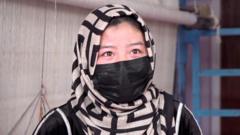With girls over 12 prohibited from attending school under Taliban rule, many Afghan women and girls have turned to carpet weaving as a means of survival. While this trade provides some income, it is often insufficient, trapping them in low-paying jobs. Despite the challenges, there are glimpses of hope as some continue their self-education and aspire for a brighter future.
Afghan Girls Embrace Carpet Weaving Amid School Ban

Afghan Girls Embrace Carpet Weaving Amid School Ban
As educational opportunities dwindle, Afghan girls turn to the craft of carpet weaving for sustenance, illustrating resilience under dire circumstances since the Taliban's return.
At a workshop situated in Kabul's bustling heart, a quiet yet industrious scene unfolds—scores of women and girls labor over vibrant carpets, their skills now their only source of livelihood since the Taliban resumed power in 2021. Among them is 19-year-old Salehe Hassani, who remarks, "We girls no longer have the chance to study... we've turned to the workshop." After the Taliban imposed a ban on education for girls above 12, many have had to adapt to new norms that limit their future potential.
Statistics revealed a disheartening reality: in 2020, only 19% of Afghan women participated in the workforce, a number that has sharply declined. The limited professions open to women in today’s Afghanistan, under the Taliban’s restrictive regime, have led to a surge in carpet weavers, with approximately 1.2 to 1.5 million individuals relying on this trade, of which women constitute nearly 90%.
As the carpet weaving industry flourishes, with the UN reporting significant exports valued at over $8.7 million within the first half of 2024, it’s crucial to highlight that the profits do not trickle down to the skilled laborers. Weavers, some of whom produce carpets selling for as much as $18,000 abroad, see little return—earning around $27 for the labor required to produce a square meter that takes weeks to complete.
Nisar Ahmad Hassieni, a workshop owner, noted that his workers earn between $39 to $42 per square meter with eight-hour shifts, yet many struggle to meet basic needs, working grueling hours without stability. The Taliban's assurances regarding the resumption of girls' education have been empty, leaving many like Salehe and her peers with dwindling opportunities.
In the impoverished districts of Kabul, where families find comfort in working together, stories of resilience arise. Shakila and her sisters, who once dreamed of careers in law and journalism, now support their family through carpet weaving—a skill passed down through hardship, now transformed into their economic lifeline. The harrowing memories of school bombings linger, impacting their lives profoundly, yet their dreams persist.
Despite the closure of formal education institutions, some have taken it upon themselves to continue learning in secret. Salehe, for example, has been studying English for the past three years and envisions one day becoming a leading doctor to uplift her country. Their tenacity and resolve paint a picture of hope and endurance against the backdrop of hardship, as these young women strive to reclaim their futures, one knot at a time.






















